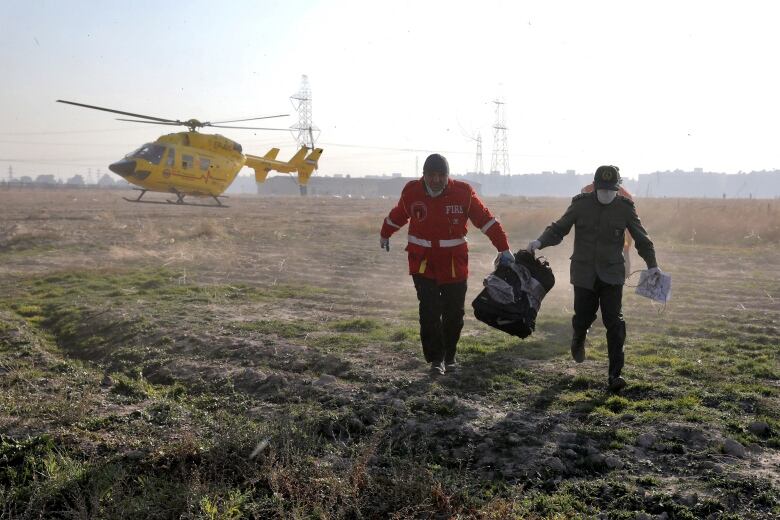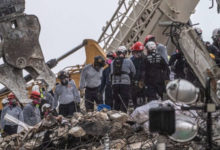Repatriating Canadian air crash victims will be hampered by a lack of diplomatic ties with Iran, experts say
The work of repatriating the bodies of Canadians killed in the airline crash in Tehran — and learning what caused the disaster — will be hampered by heightened military tensions and the fact that Canada severed diplomatic ties with Iran years back, experts say.
Under then-prime minister Stephen Harper, the federal government cut ties with Iran in 2012. The Liberals pledged to re-engage with the country in 2015 but, to date, bilateral relations have not been renewed.
Prime Minister Justin Trudeau said today that Foreign Affairs Minister François-Philippe Champagne will be reaching out to his Iranian counterpart for permission to provide assistance and maintain a presence on the ground as Iranian and Ukrainian officials investigate the crash. He said other countries also have offered to help Canada.
“We have had many countries step up to offer their support and assistance as we move forward, whether it’s Ukraine, or countries like Australia, Italy, France, to assist in our consular work on the ground,” Trudeau said during a news conference in Ottawa.
Pouyan Tabasinejad, vice-president of the Iranian Canadian Congress, said Iranian-Canadians have been between “rock and a hard place” for years because of the lack of a Canadian embassy and direct consular services in Iran. That lack will now create more complications and hardship for families of the crash victims, he said.

“The repatriation will take more time. Getting information and working with civilian aviation authorities in Iran is hampered. I think all sorts of issues will be hampered and, on top of that, it prevents Canada from mediating in this difficult situation that we’re in right now,” Tabasinejad said.
University of Ottawa Middle East expert Thomas Juneau said the Liberal plan to restore diplomatic ties was meant, in part, to assist Canadians in crisis situations like this one.
Canadian consular cases are now handled by Turkey, while Italy represents Canada diplomatically in Tehran. Juneau said he agrees that a lack of direct diplomacy could complicate the process of bringing the dead home.
Dual citizenship not recognized by Tehran
Another complicating factor is the fact that Iran does not recognize dual citizenship. Many of those killed in the crash may have been Canadian-Iranians travelling on Iranian passports. In the view of the Iranian government, those individuals could be seen as Iranians, Juneau said.
“Block repatriation? I’m not sure, but (it could) certainly make the whole process difficult,” he said.
An estimated 63 Canadians were among 176 people who died in the the Ukraine International Airlines Flight PS752 from Tehran to Kyiv. The victims included whole families, academics and students.
So far, Iran has refused to release the “black box” flight recorder which could carry vital information about the cause of the crash. While the timing led some to speculate the plane might have been attacked, the Iranian military said it was not a target and called the suggestion “propaganda.”

Rising tensions
The disaster occurred at a point of escalating conflict between the U.S. and Iran, and just hours after Iran launched a missile attack on two Iraqi military bases housing U.S. soldiers.
Juneau said the Iranian regime is notoriously secretive about issues related to aviation safety, which has been compromised in past due to global sanctions that have limited the country’s ability to buy certain aircraft and parts.
The fact that Iran has refused to turn over the black box is an early sign Tehran may not cooperate fully with the crash investigation, he said.
“Iran is super, super secretive and protective of information around all of these issues, so Canadian embassy or not … I just anticipate that we would have seen, whatever the precise circumstances, very little cooperation on Iran’s part,” he said.
No jurisdiction in probe
Because the crash occurred on foreign territory and did not involve a Canadian airline, Canada has no jurisdiction in the investigation.
The Transportation Safety Board of Canada (TSB) has appointed an expert to receive and review information released by Iran, and to monitor the progress of the investigation. The TSB said it “remains available to provide any technical assistance requested by Iranian and Ukrainian accident investigation bodies.”
Janice Stein, an international relations expert at the University of Toronto, described the situation as “very challenging” because Canada will have to work with other governments to demand access to information, accountability and repatriation of Canadians.
“Normally, we would be able to work through our embassy if we had one in Tehran, and the ambassador on the spot would in fact make all these arrangements, working closely with the Iranian government,” she said.
“We have no ambassador in Tehran. so … it will be one degree removed. We will need to work in close coordination with the Ukrainians, who have their hands full right now.”
CBC








Redes Sociais - Comentários